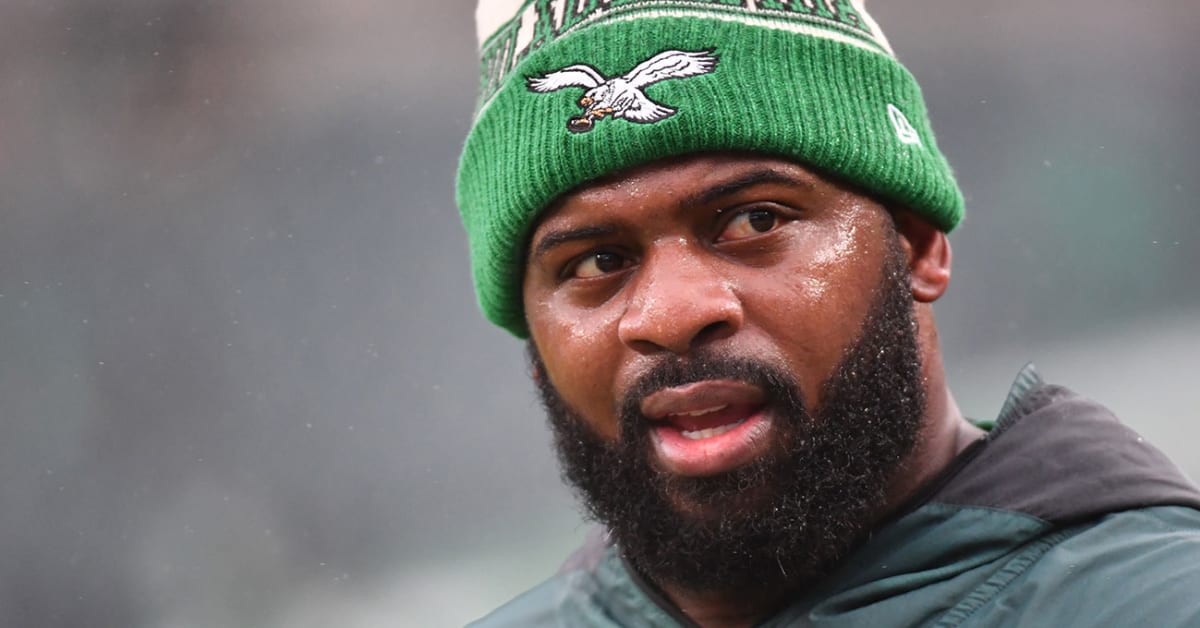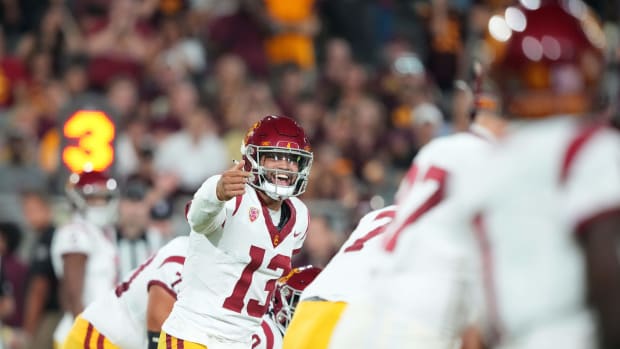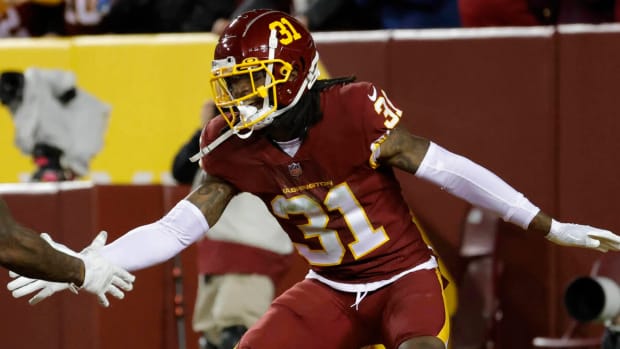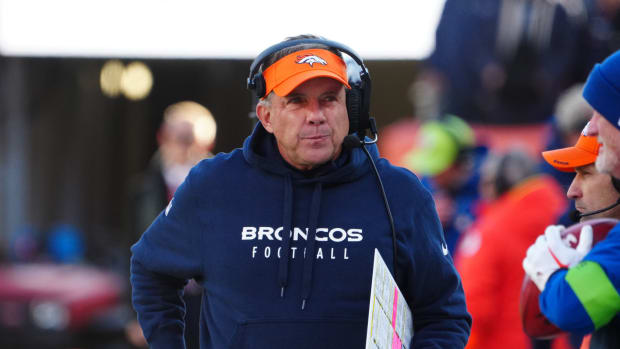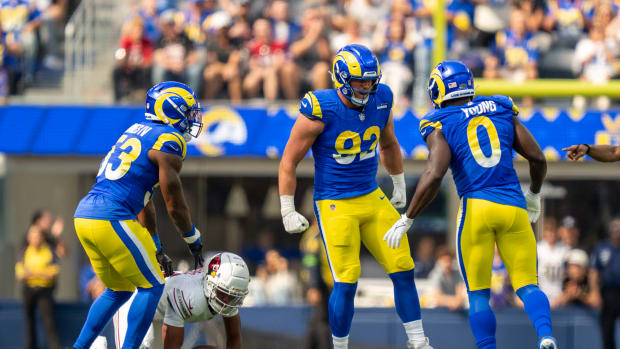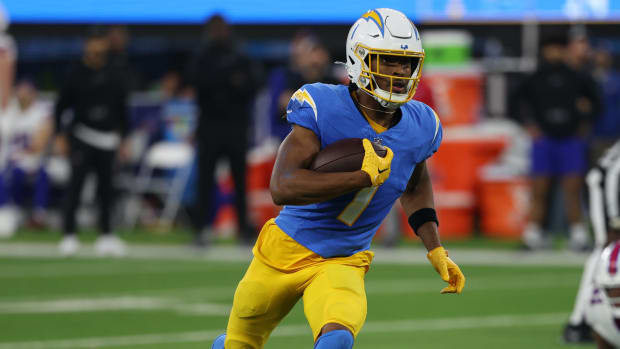Why Eagles Mainstay Fletcher Cox Keeps Coming Back
The mainstay is still there, same as always, same team and same place, in the front and in the middle of the Philadelphia Eagles’ defense. For 187 games and 181 starts at defensive tackle (with a cameo, for three seasons, at defensive end), Fletcher Cox has added consistency to a franchise with no shortage of turnover. As a member of multiple outfits’ All-Decade teams for the 2010s, he helped make Philadelphia’s defense fierce. He won a Super Bowl (LII) and reached another (LVII) and still came back, each and every season, including for this one, his 12th.
Rare is the D-tackle who plays this many seasons, grinding through roster churns and rebuilding years and punishment baked into the job description, great force pointed his way on every snap. Rarer still is the defensive tackle who does all that in the same place. But even after season No. 11, Cox wanted more—more snaps, more impact and, of course, at least one more Lombardi Trophy to hoist over his head.
Cox wasn’t the reason Philly lost last season’s Super Bowl to the Kansas City Chiefs. His seven sacks, 14 quarterback hits and seven tackles for a loss ensured the Eagles’ return to the grandest stage in sports. He hardly flirted with retiring, signing a one-year deal this past spring.

Cox has spanned several eras in Philly, playing under Andy Reid, Chip Kelly, Doug Pederson and Nick Sirianni.
Eric Hartline/USA TODAY Sports
Everyone invested in the Eagles’ success understands that peak Cox probably ended after 2020. He’s no longer the immovable force who stalked into stadiums, earning six Pro Bowl nods and four All Pro selections. He’s missed one game (Los Angeles Rams, Week 5) due to a back issue and part of another (Buffalo Bills, Week 12) with a hamstring injury. He reportedly received an epidural shot to numb the back pain, in an attempt to clash with Los Angeles, and he returned against Buffalo, despite the injury, before it flared up and forced him from the field for good that afternoon. Because Cox had last missed a game due for injury in ’17, naturally, the whispers started to pick up in recent weeks. Too old. Too brittle. Finished.
That’s not how Philadelphia views its mainstay, though. Cox has missed all of five regular-season games, ever, and two of those came when coaches rested high-value starters in meaningless season finales. He’s only 32, older for a defensive tackle but not old-old by any stretch. His snaps-played percentage has hovered around 70 all season, and, if not for the injury absences, would have marked his highest tally since 2019. His presence allows coaches to be extra creative, because he’s versatile and can slide into multiple slots on the defensive line. That’s how Philly recorded 70 sacks last season, a franchise record, and how, despite more middling statistics this year, the team still occupies the NFC’s No. 2 seed. Cox helps coaches. Cox helps elite rookies such as Jalen Carter and Nolan Smith. Cox helps everybody, even viewers astounded by the things a man his size (6'4", north of 300 pounds) can do.
Proof was delivered, once more, against Kansas City in Week 11. The Eagles trailed 14–7 late in the second quarter. The Chiefs sped to the line to try to catch the defense off-guard or, failing that, snap the ball to stop the clock. Cox happened to still be in their backfield, but not for long! Instead, he went full ballerina, leaping toward the offensive line and jumping between/nearly over the space between the leaned-down right tackle and leaned-down right guard. His leap all but screamed what should by now be obvious: not a normal human.
That, when combined with consistency, durability and work ethic, is how he became their mainstay in the first place.
A few years back, as Jim Washburn drove north from Dallas toward the coolest ranch he’d ever seen, he considered the man who owned it. Fletcher Cox was born in Yazoo City, Miss. He high-jumped. He sprinted on relay teams. And he didn’t play football so much as he wrecked football games for other players.
After 90 minutes, Washburn pulled onto the property. He scanned the 1,000 or so acres: the 7,000-square-foot lodge, exotic animals, skeet-shooting grounds, horseback riding trails and private cabins. Washburn had never seen so many cattle. Nor an offseason retreat that came with a staff. At that moment, he thought, This is beautiful and he’s already got the rest of his life down.
That’s the story. Cox grew up mired in poverty. He lost an older brother to a heart attack when Shaddrick “Trell” Cox Sr. died at 34. But … football. He played with the same hunger he felt deep inside his belly, starring at Mississippi State and climbing up draft boards.
The Eagles dispatched Washburn, their defensive line coach, for a closer look in 2012. Philadelphia held the 12th pick in what would be Andy Reid’s final season with the franchise. Washburn took three visits, hitting the road to see Michael Brockers (LSU), Alameda Ta’amu (Washington) and Cox, who worked out for him on the school’s practice field.
Cox told Washburn he weighed 294 pounds. If true, Washburn laughed, he was the biggest person of that size Washburn had ever seen. They also went to dinner and talked guns and Mississippi and dreams. On that trip, Washburn decided: Cox wasn’t good so much as ideal. Smart. Hungry. Strong. Balanced. Quick. Agile. The Eagles prayed he’d last to No. 12 and snagged him when he did.
The next 11 seasons speak to Cox’s drive and the Eagles’ history. He ranks near the top or atop any list of his generation’s best defensive tackles. He also represents a through line from the Philly Special champions to now.
“He’s a Hall of Famer, hands down, a no-brainer,” Washburn says. “There were two or three years there where he was the most dominant defensive player in the league.”
Which is wild, when considering that the mainstay didn’t grow up with anything resembling consistency.

Cox has played all 12 of his seasons as an Eagle with Brandon Graham as a teammate.
Eric Hartline/USA TODAY Sports
Located about an hour north of Jackson, Yazoo City is the gateway to the Mississippi Delta. It’s also known as the hometown of Fletcher Cox. Raised by a single mother in a single-high trailer with three rooms, there was little to project where his life would lead beyond the advice his mother, Melissa, often gave him: “Find a career that will get you out of this place.”
Fletcher didn’t disagree. He saw her head to work at the Nissan supply factory every day at 2 p.m., not to return until 10:30, and when she did, her body was slumped, eyes heavy from fatigue. She sacrificed so he could follow through, while Shaddrick, his older brother, pitched in to take care of him. Everyone called him “Bug Eye” then; the nickname bestowed by a favorite cousin and close friend, Melvin Baker.
Melissa didn’t allow her youngest to play football for years. She flat-out refused to sign papers granting him permission. “I don’t want my baby to get hurt,” she’d tell him, noting his then lithe frame, a childhood, she said during the Philly Special run, spent at “50 pounds soaking wet.” Persuading her fell to an old high school classmate turned high school football coach. Tony Woolfolk called, begged, cajoled. In eighth grade, mom finally relented. The clincher? “I said he’s the one who might hurt somebody,” Woolfolk said in early 2018.
His mother regarded football as one interest, nothing more, and Fletcher had a lot of those. He played his preferred childhood sport (basketball) and ran track, plus roller skating, skateboarding and baseball. But the teenager who once balanced atop small boards and flew down local streets kept growing. In his case, Fletch was the beanstalk. And by high school, Bug Eye stood 6'4" and weighed 220 pounds.
Woolfolk put Cox on the offensive line. As a guard, he loved to pull and lead backs 70 yards down field into end zones. But Cox told his coach he could play D-line, too. So he did both, while snapping for punts and field goals (!), kicking off (!) and blocking on return teams. He did, well, everything. He played on the school’s seven-on-seven team, despite the fact that no other linemen did, transitioning to linebacker. They won a national championship. It wasn’t just his size that made him a college prospect. Like a champion boxer, Cox understood that power came from speed more than from heft, and the sprouting goliath ran the third leg of the 4x200-meter relay. The kid from Yazoo City could fly, too. He chased running backs halfway down the field, passing corners and safeties on the way. He continued growing, until he weighed 245 pounds. He was raw and would miss gaps, turn the wrong way, spin in circles and still make tackles.
Woolfolk likes to explain Cox this way: as versatile, multiple, staggering in variety. He’ll run through all the football stuff, the other sports and then say that Cox would “cook the popcorn, flip the burgers, run the concessions stand, turn off the lights after the game ended, drive fans home, fix flat tires and, if you’re hungry, bring you some deer from hunting the next day.” To wit: On flag football teams, Cox even starred at quarterback. He ran a mean read-option. “If Nick Foles goes down,” Woolfolk said before the Eagles’ played the Patriots in that Super Bowl, “you can put him at quarterback, and you’d still roll.”
Cox stayed close to home, to mom, for college, enrolling at Mississippi State. His defensive coordinator there, Geoff Collins, described Cox in 2018 as an absolute beast and freak of nature who also loved to work. “From the second he stepped foot on campus,” Collins said then, “his mission was to be an elite player and a dominant force in the NFL.”
In a Southeastern Conference known for dominant defensive linemen, Cox dominated at a level no one had ever seen. He didn’t take over games; he won them, sometimes by himself. Offensive coordinators slid help inside, a rarity that gives defensive ends space and linebackers clear views at backs. In fact, Collins said, in one season, while roaming behind Cox, two backers ranked in the top five in tackles for the conference.”
In college, Cox blocked five field goals. Conscious of the poverty that surrounded him through childhood in Yazoo City, he also saved his per diem money for meals after games, along with any other NCAA stipends. He still remembered what his mother told him. He was out—and he wasn’t going back. The core remained, though. Cox didn’t wear wristbands, didn’t paint Bible verses on his cheeks, didn’t call attention himself at all, really. He walked into stadiums, donned shoulder pads and his uniform, and crushed not just teams or quarterbacks. He crushed souls.
“I bet there’s not more than 30 humans in the history of the world that have been as big, fast and strong and as agile as him,” Collins said then. “In the history of the world.”
In 2012, a forever mustachioed head coach listened to one of his most trusted assistants. When Washburn told Reid that Cox fit the Eagles’ defensive scheme—a Wide 9/4–3 system that tasked interior D- lineman to “rush, crush and close”—as well as any player could, they took him.
In 2016, no longer Bug Eye, Cox signed an extension as large as his frame, which, at that point, was 310 pounds. The kid from Yazoo City could make $103 million in that deal, and his guaranteed money ($63 million) marked the largest ever earned by a nonquarterback at that point. In ’17, he moved onto Philly’s all-time sack list, where he currently ranks fifth. The Eagles included him in a mural they created of all-time franchise defensive legends. There he was, the kid from Yazoo City, alongside Reggie White, Brian Dawkins, Chuck Bednarik and Jeremiah Trotter. In those 11 seasons, this same kid banked almost $116 million. All because “he changed games,” Eagles coach Nick Sirianni said in February.
The Super Bowl loomed in a matter of days. On opening night, nearby the dude wearing a barrel; the guy carrying fuzzy, pink handcuffs; the Nacho Libre wrestler; and the mascot dressed like a stick of deodorant, the kid from Yazoo City, was surrounded by dozens of reporters. Diamonds glistened on the watch that hung from his left wrist like a Frisbee. A boom mic landed too close to his face, and he swatted it away like an overmatched offensive lineman.
“Philadelphia,” he said that night, “changed my life.”
Cox is one of four Eagles mainstays, along with Jason Kelce, Lane Johnson and Brandon Graham, four through lines from Super Bowl LII to now. Cox is also a mammoth and springy defensive tackle who has spent 12 seasons tossing guards like salads and carving out a potentially Hall of Fame career.
Sometimes, as the end of what could have been his final season grew closer and closer, Cox thought back to a random afternoon in the Eagles’ locker room. His former teammate, tight end Zach Ertz, liked to find Cox before games in January and February and remind him, year after year, sometimes with an expletive or five, that Cox was the best player on the field.
Playoff Fletch, Ertz called him. But even outsized success came with a high (and heavy) cost.

Cox wraps up Isiah Pacheco during Super Bowl LVII. He also had two QB hits against Tom Brady when the Eagles won Super Bowl LII.
Eric Hartline/USA TODAY Sports
The first death occurred in August 2012, just before the start of his rookie season in Philadelphia. Upon hearing the news, Fletcher called his mom. She’ll never forget the first words that flew out of his mouth. “Melvin died,” he said. In a car accident. She did what moms do. She told him that everything would be O.K., that God didn’t make mistakes. Fletcher flew back home, transforming back into Bug Eye, the moniker Baker had given him all those years ago. He mourned his friend, then reported back to work. Baker was 21 years old.
The second death? Same year, same season. Fletcher lost his grandmother to an undisclosed illness. He still went back to work.
The third death: in 2016, his second Pro Bowl campaign, his brother. Again, he called his mom. “They had to rush Shad to the hospital!” he said. A friend called her from there, and she could hear Shaddrick saying, “Don’t let me lie down. Just sit me up. I can’t breathe when I lie down.”
It was Jan. 5. Shaddrick had gone to pick up a Chevy Tahoe he had purchased and planned to fix up and trick out. Before he left the parking lot of the dealership, he suffered a heart attack. He had heart issues bubble up for years, plus diabetes. He was 34.
Fletcher loved his older brother, whom he often called Trell. Big bro loved cars and was into drag racing; he’d take Cox to the track on weekends in search of speed and thrills. This is why, once firmly entrenched in the NFL, Cox bought a drag racer he named Gold Dust. He doesn’t drive it much but keeps it, making sure it’s polished, shiny and operable, in his brother’s memory.
His high school defensive line coach, David Wallace, also died, and suddenly. Cox did more than mourn. He carried all of them—and all of Yazoo City—with him. Before games, he crossed his chest, kissed his fingertips and threw a meaty digit toward the sky. Then, in special tribute to his older brother, he swayed before national anthems, looking skyward once more and whispering the same four words. I love you, bro.
The kid from Yazoo City hasn’t changed, not even in Season 12, when the injuries descended. Cox had a sack in three straight games this December, including a strip of Dak Prescott that was returned 42 yards for a touchdown. There remains but one thing left for him in football, and it’s the same thing he wanted last season, not to mention what powered another return. Cox opened several businesses in recent years. He bought his mom a truck, a house. He’s Philadelphia’s nominee for the Walter Payton Man of the Year award, which might be the only accolade he hasn’t won yet. He needs nothing, nothing he can purchase at least. But all the deaths, his mom said back in 2018, “made him try for perfection even more."
He wants another Super Bowl ring. For them.
































